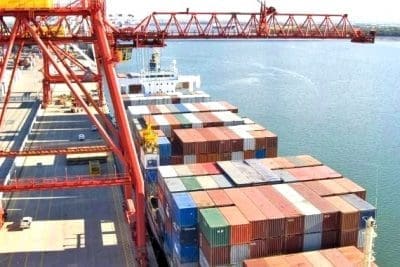ALMOST 50,000 United States waterside workers have executed their threat to go on strike over a wages claim, causing the first shutdown on US East Coast and Gulf Coast ports in 50 years.
The effects of the indefinite strike, which started overnight, are expected to ripple through the country, with one credible estimate suggesting an economic loss of $3.78 billion if the strike lasts only for one week.
 The last time the International Longshoremen’s Association struck in 1977, the port closure lasted six weeks, creating trade chaos.
The last time the International Longshoremen’s Association struck in 1977, the port closure lasted six weeks, creating trade chaos.
Click here to read Beef Central’s earlier story from Friday on the looming US port strike, and the implications for Australian chilled and frozen meat exports to our largest export customer.
Time-sensitive imports, such as food, are likely to be among the goods first impacted.
September saw a dramatic rise in Australian beef exports via US East Coast ports, as trading partners anticipated the start of today’s wharf strike action, putting extra tonnage into cold storage. East Coast US ports accounted for no less than 24pc of Australia’s entire September beef exports, DAFF records show.
The longer the strike persists, the greater the delays and challenges for logistics, with container vessels being diverted to other ports or going into demurrage, empty shipping containers being stockpiled and other challenges.
Pressure will grow on US west coast ports (not involved in the current strike action) likely to become quickly be overwhelmed, logistics commentators said this morning. On top of that, goods being offloaded in west coast ports, bound for customers in the US eastern states, will face substantial additional road or rail freight costs to get to market.
Some meat traders are considering air freight as a means of keeping supply chains fed, Beef Central reported on Friday.
The strike involves 14 major US ports along the east and gulf coasts, halting container traffic from Texas to Maine, north of New York. The ports involved handle more than half of all US imports.
The action comes just five weeks before the US election, and already the issue is becoming politicised.
US President Joe Biden has the power to suspend the strike for 80 days for further negotiations, but the White House has said he was not planning to act.
Talks over the union’s wages claim have been stalled for months and the current contract between the union and US Maritime Alliance (USMX), the body representing the major shipping lines like Maersk and Evergreen expired yesterday.
On Monday, USMX said it had increased its offer to longshoremen, which would raise wages by almost 50pc over six years. It yesterday called called for a contract extension to allow talks to continue. A 2020 report on longshoremen working in the US ports of New Jersey and New York showed the median annual pay was around US$160,000. The longshoremen receive an additional bonus funded by a fee on containers.
Union leaders have also voiced concerns about threats from portside automation.
The union said workers are owed after shipping firm profits soared during the COVID period, while inflation hit salaries. It has warned to expect a wider strike of its members, including those not directly involved in the current dispute.
The union is seeking significant pay raises after rates in the previous deal failed to keep up with inflation. Protections against the automation of port work have also been a major sticking point.
The strike is the first such action by the ILA since 1977, when longshoremen stopped work for more than six weeks.
“It really is just a question of duration,” Bruce Chan, a transportation analyst at investment firm Stifel told the Washington Post this morning.
“If we see a strike that lasts for a less than a week, we think it’s relatively digestible for the system.”
“But the longer it goes, the more expensive it becomes, and that’s when it becomes very noticeable to the US consumer,” a senior economist at the US Conference Board said.
